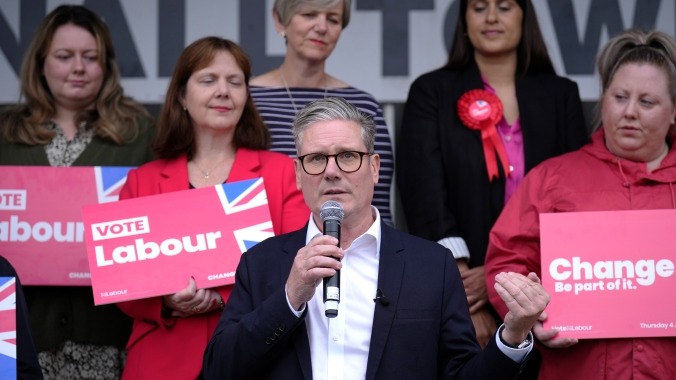Labour Cleans Up in UK Elections, But It’s Complicated
Photo by Christopher Furlong/Getty Images
The United Kingdom’s Labour Party won the country’s elections in a landslide, making Keir Starmer the new prime minister and ending 14 straight years of Conservative rule.
Labour’s victory is momentous, but not a total shock. The party dominated the polls for weeks, with some pundits calling it an “extinction-level” event for the Conservatives, or Tories. The entire country was fed up with Tory leadership after more than a decade of austerity measures that led to big cuts in public spending and social programs; a chaotic divorce from the European Union; political scandals; a wild economic crash – you get the idea. People wanted change. Starmer just had to avoid messing it up and the premiership was his.
The reversal is pretty striking. In 2019, Labour was in disarray after the Tories won a historic majority, flipping seats in traditional Labour strongholds. Now, the party is expected to take more than 400 seats, with the Tories winning around 120 – the worst showing in its 200-year history. Lots of prominent Tories got trounced. Outgoing Prime Minister Rishi Sunak held on (he told people he thought he’d lose). But Sunak’s predecessor, Liz Truss, was ousted. The constituencies once belonging to Boris Johnson, Theresa May, and David Cameron all flipped. It was an indisputable rebuke of Tory leadership.
Still, for a change election, there is something kind of anticlimactic about it all. Despite Labour’s large lead throughout the election, Starmer ran a pretty safe, centrist, don’t-rock-the-boat campaign. Turnout in the election was low, around 60 percent, something Labour worried about, as they feared the seeming inevitability of their win might convince people to skip the vote. Scotland is mostly responsible for Labour’s renewed strength, where Labour capitalized on the crash of the once-ascendant Scottish National Party (SNP), now mired in infighting and political scandal. “Actually, but for the rise of the Labour Party in Scotland, which has been truly spectacular, we would be reporting that basically Labour’s vote has not changed from what it was in 2019,” said John Curtice, a politics professor and the UK’s top election guru.
Overall, voters expressed less enthusiasm in electing Labour than an eagerness to see the Tories gone. The Liberal Democrats, a centrist party, won about 70 seats – netting more than 60 – in its best election results in a century. The Greens went from one seat to four, including snatching two rural seats from the Tories. A bunch of independent candidates succeeded, too, including former Labour leader Jeremy Corbyn, who was kicked out of the party. Independent MPs also won in a few districts with large Muslim populations, as voters broke with Labour over its stance on Israel and Gaza.
Then there’s Nigel Farage. The Brexit provocateur will enter the House of Commons for the first time as part of the right-wing Reform UK. Reform UK only won four seats, but that’s mostly because of the UK’s first past-the-post system. Farage’s party got about 14 percent of the vote, to the Tories’ roughly 24 percent. As Curtice noted, around two-thirds of the seats that the Tories lost are those where, if Reform voters had stuck with the Tories, the Tory candidates would have likely held on. The radical fringe is very much challenging Britain’s mainstream party.
All of that certainly complicates the narrative of Labour’s rout, and it offers some warning signals for the party.
Britain faces colossal challenges. Starmer must tackle its sluggish economy, repair its national health service, address cost of living concerns and housing affordability, and mend the UK’s relations with the European Union, just to name a few. But as Tiernan Cannon wrote in Splinter, Starmer has “watered down or entirely turned his back” on some of his boldest promises, including on climate investments and increasing taxes on the country’s highest earners. Labour’s manifesto – basically, its governing playbook – lays out plans to address things like reducing the long wait times for the National Health Service. But many observers are struggling to see how Labour will pay for these reforms, as the party seeks to avoid major spending cuts, but also says it won’t do things like raise income taxes. For example, its plan to add thousands of additional appointments at the NHS will be paid for by “cracking down on tax dodgers” and closing loopholes.
Maybe Starmer’s pragmatic centrism and promise of stability is the antidote to 14 years of Tory radicalism. He and the Labour Party have prevailed, even as the center crumbles in other Western democracies. “Change begins now,” Starmer said after Labour’s victory. These election show that Britain definitely wanted change, but not every voter is convinced Labour can deliver it. That will be Starmer’s colossal test, and it begins now.